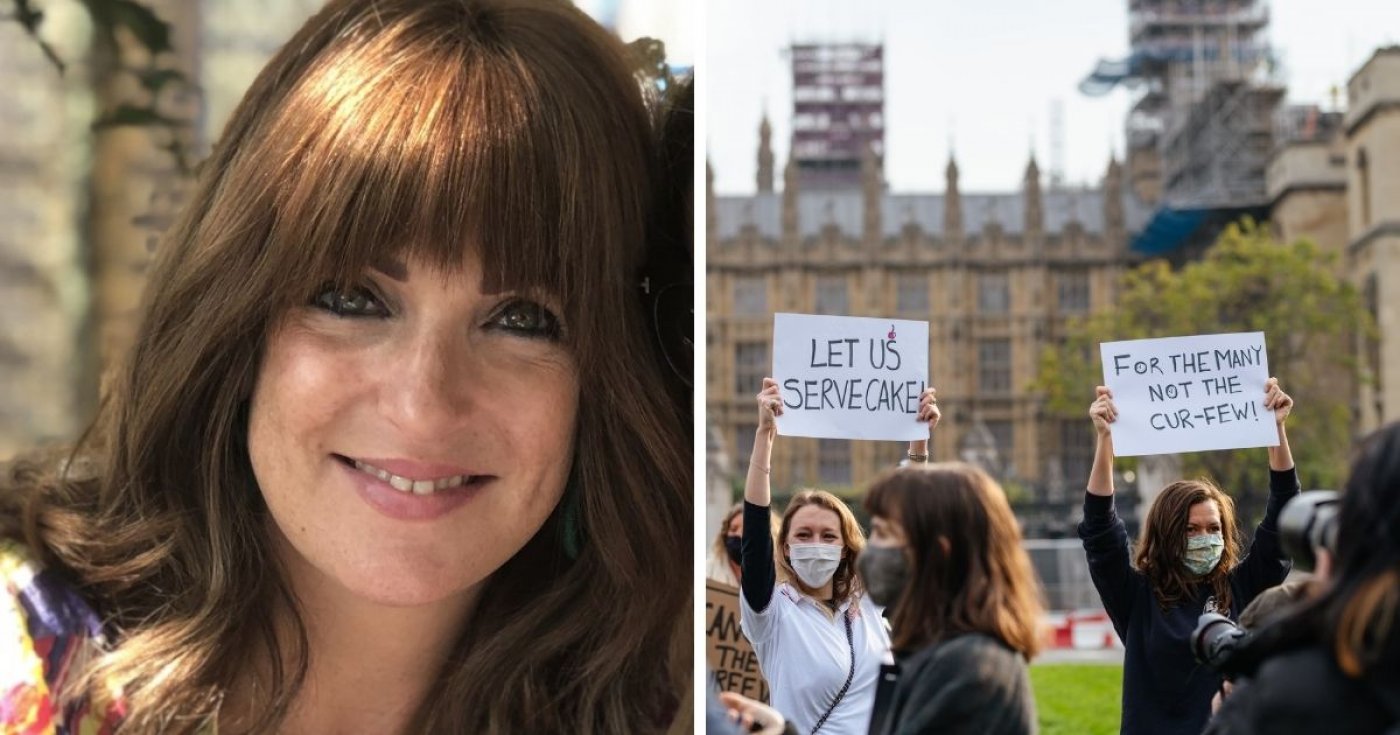'That's why we want to make some noise, so today, at least, they can hear us'
Today, hospitality professionals met on Parliament Square to raise the alarm bells for the industry, urging government to take their experiences on board and revise the restrictions.
After the first event on October 19th, founder Rachel Harty said the demographic of people that came was very different.
"The first demo at the start of October was primarily chefs and restaurateurs - but since the new tier system came into place which is seriously affecting wet-led places, mainly pubs and bars with the substantial meal fiasco - we've seen more bartenders, bar owners and publicans than last time."
The wet-leds
Head bartender at Dukes Bar, Alessandro Palazzi, was one of them.
Asked why he decided to attend, he said: "I'm in a very privileged position, but a lot of my colleagues are not. We're losing jobs, we're losing service charge - politicians at the moment haven't got a clue what goes on in hospitality. It is one of the safest places to be, and yet they punish us."
"If you come to the bar where I work you have to track and trace and wear a mask. You go to the supermarket, there's no track and trace and everybody's everywhere, it doesn't make sense."
"Call me cynical if you want," he continued, "but I think that lot in Westminster believe that there are only foreigners in hospitality, so they don't give a damn."
"That's why we want to make some noise, so today, at least, they can hear us. If we make enough noise, people will talk."
Whether or not protesting for legislation change will be effective, he said: "Anything helps. The fact that we make noise helps. A lot of those guys in Westminster use our establishments, they come to drink and eat, so they know what's happening, but for some reason they don't seem to care."
London calling
But today wasn't just about wet-led businesses. London's city centre remains in many ways a ghost town and has been so for nine months, Volta Do Mar co-owner Isabel Almeida Da Silva explained.
"And if the restaurants aren't open, for example in Covent Garden, it affects everyone - suppliers, other businesses, nobody survives."
Struggles are different for hospitality businesses up and down the country, but one of the main considerations in London is that not only are people not coming into central because they're told to avoid public transport, but congestion charges have been extended to 7am to 10pm, seven days a week.
This is only adding insult to injury, Isabel explained, they have had no infections flagged at their restaurant, nor have any other businesses in their area. "We are really careful. They told us to be careful so we were."
"The PHE data shows that hospitality accounts for 3 percent of all infections," and if this is what needs to be done to keep the virus at bay, she said, "they really need to extend the VAT rate reduction and let safe businesses operate normally, not on reduced hours."
"We are safe, so let us open."
What would help?
No protest is without demands, and Rachel talked us through some of the specifics that the Hospo Demo movement was pushing for today.
These include a VAT waiver for alcohol sales, as the current reductions only apply to food sales, and a revision of restrictions to be both fair and effective.
"We really don't feel that there's been any scientific basis for a lot of the restrictions that've been in place," she said, including the single household rule and the imposition of a substantial meal. "They're making it impossible for lots of businesses to even open, let alone trade profitably."
But one single change which would really affect the industry's standing, and which people can support from the comfort of their own homes, she explained, is the establishment of a hospitality minister.
To this end, a petition was launched in October, but currently only has 50,000 signatures.
"It needs 100,000 to be discussed in Parliament, so we would urge people to sign that. By having a hospitality minister, that means that the nuances and quirks of our industry can be taken into account when deciding on rules and regulations that affect people so much."
An illustration of this is the fact that TRONC payments aren't taken into account in the furlough scheme, so where people are meant to be entitled to 80 percent of their income, they are barely getting a third.
"They just can't live that way. A hospitality minister would really help with things like that, for the negotiations," she said.
An effective movement?
As after the last demonstration the Chancellor rolled out an extension of the support to be given to hospitality, the movement has had its successes.
"But that was pretty minimal," Rachel said.
"It was really not enough at all. We know he listens, but I think people are really starting to understand the devastating impact on this industry of constant restrictions. It's been nine months since all of this started - so hopefully they're going to be considering things differently."




{{user.name}}